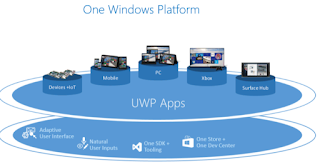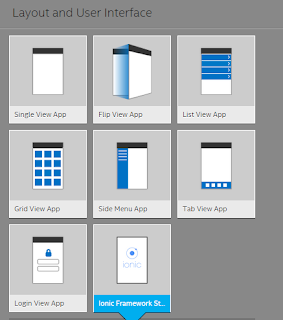Universal Windows Platform: Develop apps that includes phones and tablets
You will be hearing about this more and more as Windows 10 devices start appearing in increasing numbers that may reach billions.
Before Windows 10, the OS was Windows 8.1 and there were two devices
that were targeted by code:
this the Windows Runtime (WinRT), an evolution of the Windows app model
was introduced as a common application architecture.
With Windows 10 that has changed. Now there are a number of devices for
which you need to code has increased. Hence Universal Windows Platform
(UWP) was born.
WinRT gets evolved to be integrated with Windows 10 Core. This core
provides a common platform for every device that runs Window 10. UWP now
calls WinRT common for all the devices PLUS also APIs(Win32 and .NET)
that are specific to the device family the app runs on. Thus UWP
provides a guaranteed core API layer for all devices.
What it means is that your app can be deployed to the device type you are
using. All devices use the same runtime but have their own unique API determined by the device type. The code access for those unique APIs specific to the device are conditional.
Note: Images are from Microsoft Site.
Before Windows 10, the OS was Windows 8.1 and there were two devices
that were targeted by code:
- Windows
- Windows Phone
this the Windows Runtime (WinRT), an evolution of the Windows app model
was introduced as a common application architecture.
With Windows 10 that has changed. Now there are a number of devices for
which you need to code has increased. Hence Universal Windows Platform
(UWP) was born.
WinRT gets evolved to be integrated with Windows 10 Core. This core
provides a common platform for every device that runs Window 10. UWP now
calls WinRT common for all the devices PLUS also APIs(Win32 and .NET)
that are specific to the device family the app runs on. Thus UWP
provides a guaranteed core API layer for all devices.
What it means is that your app can be deployed to the device type you are
using. All devices use the same runtime but have their own unique API determined by the device type. The code access for those unique APIs specific to the device are conditional.
Note: Images are from Microsoft Site.





Comments